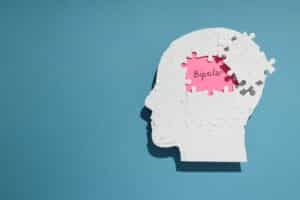After being diagnosed with an anxiety disorder, it can be tempting to attribute all feelings of intense anxiety to your mental health condition. However, it’s important to be aware that other conditions can also cause or worsen feelings of social anxiety.
Having an anxiety disorder doesn’t mean you can’t also develop a concurrent medical condition. However, knowing this can leave you asking, “Is this my anxiety disorder, or is it something else?”
Types of Anxiety Disorder
Generalized Anxiety Disorder (GAD)
GAD is characterized by persistent and excessive worry about a variety of topics, including health, finances, work, or family. People with GAD often feel like they can’t control their worry and may find it hard to focus or relax. Symptoms of GAD include feeling restless or wound-up, having difficulty with separation anxiety, feeling easily fatigued, and having muscle tension or headaches.
Social Anxiety Disorder (SAD)
Also known as social phobia, SAD is a type of anxiety disorder that involves extreme fear of social situations. People with SAD may worry about being judged by others or embarrassed in front of others. They may avoid social situations altogether or else endure them with intense feelings of excessive anxiety. Symptoms of SAD include blushing, sweating, trembling, difficulty speaking, and an upset stomach.
Specific Phobias
A specific phobia is an intense fear of a specific object or situation that poses little to no actual danger. Common phobias include fear of closed spaces (claustrophobia), heights (acrophobia), flying (aviophobia), dogs (cynophobia), snakes (ophidiophobia), needles (trypanophobia), and blood (hemophobia). People with phobias will often go to great lengths to avoid their feared object or situation. For example, someone with aviophobia may never fly on an airplane or someone with claustrophobia may avoid using elevators. Symptoms of phobias include rapid breathing, racing heart, sweating, trembling, and nausea.
Mental and Physical Symptoms of Anxiety Disorder
There are several types of anxiety disorders. Two of the most common disorders and their associated anxiety symptoms are listed below.
Generalized Anxiety Disorder Symptoms
- Excessive worry that is difficult to control
- Restlessness
- Fatigue
- Difficulty concentrating
- Irritability
- Muscle tension
- Sleep disturbance
- Social phobia
Panic Disorder Symptoms
- Heart palpitations
- Sweating
- Trembling
- Shortness of breath
- Chest pain
- Gastrointestinal discomfort
- Dizziness or lightheadedness
- Body temperature fluctuations
- Numbness or tingling sensations in the hands or feet
- Sense of impending doom
- Intense fear
Several common medical diseases can be present with symptoms similar to anxiety. Knowing the signs and symptoms can help you differentiate the two. Still, sometimes determining what’s causing your symptoms can be difficult. This is especially true if you are experiencing a new symptom that doesn’t typically occur with your social anxiety disorder. If you aren’t uncertain, it’s always better to seek medical advice to be sure.
Cardiovascular Disease
Many types of cardiovascular disease can present with symptoms of anxiety.
Heart Attack (Myocardial Infarction)
When a person goes to the emergency room out of concern for a heart attack, panic attacks are usually part of the differential diagnosis list. This is because panic attacks share many of the same symptoms as a myocardial infarction: chest pain, palpitations, shortness of breath, fatigue, and fear of dying.
Key differences: Heart attacks typically occur with physical exertion, while anxiety attack often occur at rest. Chest pain in a heart attack is often described as pressure, while chest pain during a panic attack may be sharper. These differences are not absolute, and due to the seriousness of heart attacks, it’s always better to seek immediate medical help if there is any uncertainty.
Congestive Heart Failure
Congestive heart failure (CHF) can present with similar symptoms of anxiety, particularly shortness of breath and fatigue. Though CHF typically isn’t as emergent as a heart attack, it can cause acute exacerbations requiring emergency medical attention.
Key differences: Congestive heart failure typically occurs in a fluid-overloaded state. The heart is unable to pump blood efficiently, resulting in fluid backing up in the lungs and vessels. Patients with CHF often have edema, especially in their lower extremities; anxiety does not cause this. The shortness of breath and fatigue from a congestive heart failure exacerbation usually won’t improve without medical intervention to help remove this fluid.
Arrhythmias
Cardiac arrhythmias are irregular heart rhythms that occur due to dysfunction in the electrical circuitry within the heart. These can present with rapid heart rate, chest pain, shortness of breath, fatigue, and other anxiety-mimicking symptoms.
Key differences: While arrhythmias and anxiety can cause an increased heart rate, only arrhythmias will cause the heart to beat irregularly. However, this cannot reliably differentiate the two because you could have an underlying arrhythmia worsened by anxiety. An irregular heartbeat needs a medical workup because certain arrhythmias can be dangerous if left untreated.
Respiratory Disease
The list of diseases that can affect the respiratory system and cause shortness of breath is extensive. Two of the most well-known are asthma and chronic obstructive pulmonary disease (COPD). Shortness of breath is a common complaint from someone suffering from an acute exacerbation of either of these respiratory diseases. It is also a common symptom of anxiety.
Key differences: Anxiety and respiratory disease can make you feel short of breath and hyperventilate. With anxiety, your lungs can usually still adequately oxygenate your body. In respiratory disease, there’s some underlying pathology in the respiratory system, and oxygen levels may decrease. Shortness of breath from an underlying pulmonary disease often requires health care intervention.
Thyroid Disease
The thyroid gland is responsible for synthesizing and storing thyroid hormones that regulate your body’s metabolism. When the equilibrium of these hormone levels gets disrupted, it can have significant effects on your health. Hyperthyroidism, in which too much thyroid hormone is produced, can cause symptoms similar to anxiety.
Key differences: Hyperthyroidism can present almost precisely like a panic attack and may require blood work to differentiate. Hyperthyroidism can be a medical emergency.
Diabetes Mellitus
There are two primary types of diabetes mellitus: type 1 and type 2. Both diseases are capable of causing elevated blood glucose levels (hyperglycemia), and the medications used to treat them can cause low glucose levels (hypoglycemia).
If blood glucose levels get too low or high, you can develop symptoms that also occur with anxiety. In extremely high blood glucose levels, patients can develop drowsiness, confusion, nausea, vomiting, and shortness of breath. If blood glucose levels get too low, you can develop sweating, trembling, increased heart rate, lightheadedness, or loss of consciousness.
Key differences: In hyperglycemia from diabetes, patients might experience excessive thirst or urination. Ultimately, both situations can be hazardous medical conditions in their most severe forms that may require intervention by a medical professional.
Being Aware
The list of medical conditions with symptoms that overlap with anxiety disorders is long. Knowing a few of the most common medical conditions and some key differences can help you know when the symptoms you are experiencing might be more than your anxiety disorder.
Ultimately, many of these conditions could be differentiated by their persistence beyond resolving your anxiety. However, it may not be possible to completely resolve your anxiety during an acute episode of one of these conditions. Increasing your knowledge and awareness can help you understand when to seek treatment for yourself or a loved one.
Numerous medical conditions can present with signs or symptoms similar to those of anxiety disorders. Attributing these symptoms to your underlying anxiety disorder can delay the diagnosis and treatment of a serious medical condition. Knowing some of the more common diseases and how to differentiate them from anxiety disorders can be beneficial. At Southern California Sunrise Recovery Center, we understand the importance of helping to educate our clients. It is essential to recognize the symptoms of your anxiety disorder and know when to seek medical care. If you or a loved one have an anxiety disorder and want to learn more about recognizing symptoms of diseases that can mimic anxiety, call us at (714) 942-4143 today.







